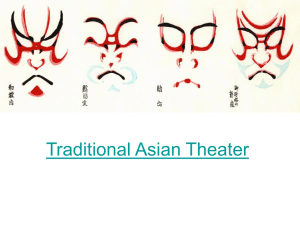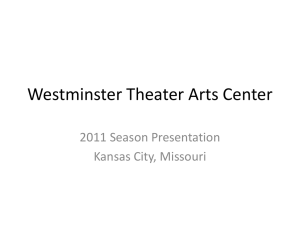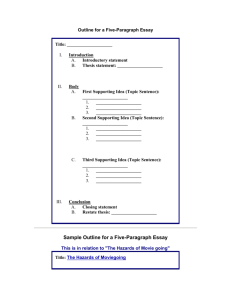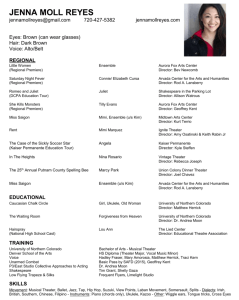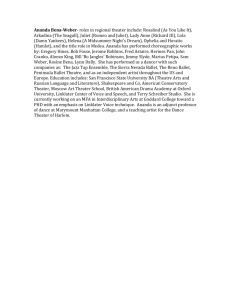Yvette Martínez-Vu Theater and Performance
advertisement
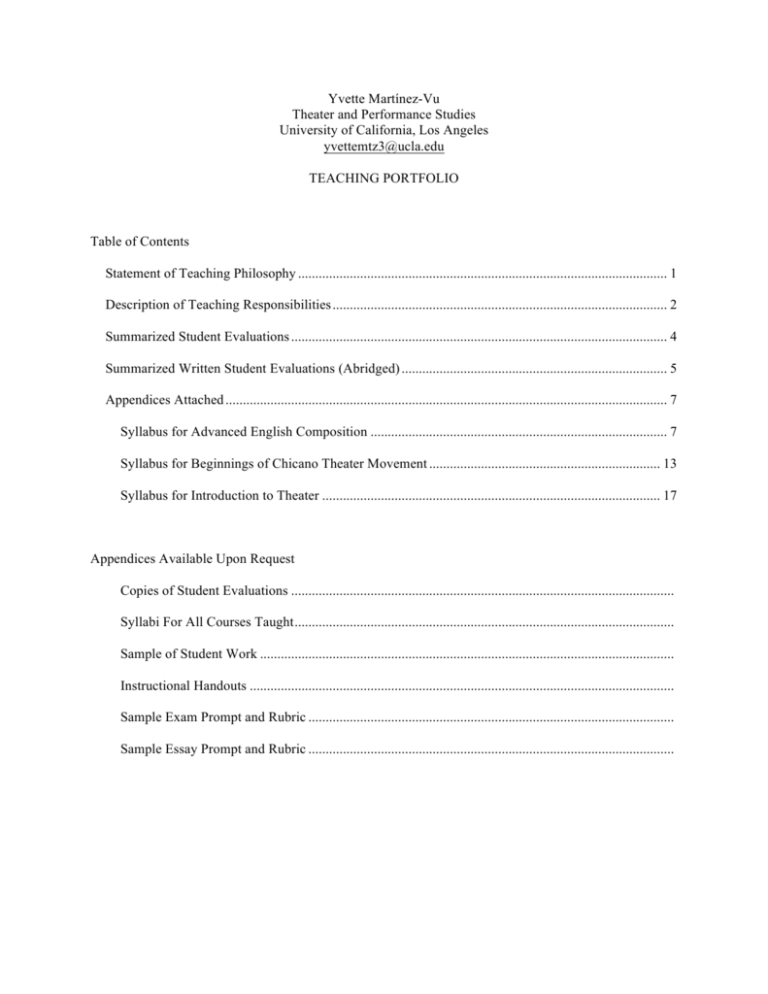
Yvette Martínez-Vu Theater and Performance Studies University of California, Los Angeles yvettemtz3@ucla.edu TEACHING PORTFOLIO Table of Contents Statement of Teaching Philosophy ........................................................................................................... 1 Description of Teaching Responsibilities ................................................................................................. 2 Summarized Student Evaluations ............................................................................................................. 4 Summarized Written Student Evaluations (Abridged) ............................................................................. 5 Appendices Attached ................................................................................................................................ 7 Syllabus for Advanced English Composition ...................................................................................... 7 Syllabus for Beginnings of Chicano Theater Movement ................................................................... 13 Syllabus for Introduction to Theater .................................................................................................. 17 Appendices Available Upon Request Copies of Student Evaluations ............................................................................................................... Syllabi For All Courses Taught .............................................................................................................. Sample of Student Work ........................................................................................................................ Instructional Handouts ........................................................................................................................... Sample Exam Prompt and Rubric .......................................................................................................... Sample Essay Prompt and Rubric .......................................................................................................... 1 Statement of Teaching Philosophy I structure my classroom with the goal of incorporating experiential forms of learning. As an instructor trained in performance studies, I bridge theory and practice with hands-on workshops to equip my students with the necessary tools to navigate their courses. I also organize every class in such a way that my students will have the opportunity to apply theories practically. For example, I ask students to perform scenes from texts informed by a concept discussed in class. Thereafter, they lead their peers in discussing how the concept also informed their reception of the performance. I prioritize an intersectional approach to reading. For example, I use directed reading to teach about the relationship between language and feminism. In my Chicana/o literature course, students read Gloria Anzaldua’s “La conciencia de la mestiza / Towards a New Consciousness” twice, once focusing on the politics of language and again with a concentrating on U.S feminism. First, I explain the concept of intersectionality to the class. Afterwards, we analyzed different excerpts of the piece to examine shifts in the author’s language from English to Spanish. Then the class analyzes moments of codeswitching wherein certain gendered Spanish phrases— such as “mestiza” and “Chicana,” are italicized while others are not. In an in-class reflection assignment, one student stated, “Some of the struggles that mestizos have to endure are trying to juggle two cultures. I interpret Anzaldua as using different punctuation to come to terms with her multiple identities.” Students learn from this analysis that punctuation matters and that Anzaldúa’s use of italics places an emphasis on both the feminine gender and the cultural practice of speaking Spanish, which mirrors her Chicana feminist beliefs. To strengthen my student’s writing skills, I create workshops that address writing as a multi-step process. When teaching writing-intensive courses, I assign several papers that build on each other. The final paper, for example, is an intensive revision of an earlier paper. First, they exchange papers with a partner who locates confusing sentences before they proofread together. I emphasize peer-review exercises that break down writing into multiple drafts, so students can learn that writing is a skill that takes time, regardless of one’s writing-level. Prior to submitting their final paper, I have students “perform” their paper in another genre (poetry, short story, or drama) to get them to think about their argument in another medium. This performance also allows them to gather feedback from their peers. Student evaluations have identified the effectiveness of my process-based writing strategies, averaging at 8.3 out of 9 in instructor effectiveness. I also stress experiential learning by assigning reflective exercises in which students must consider their own personal background against the author’s. In one exercise, they read documents from the Walt Whitman archive, including a Spanish letter he wrote in 1883 that addressed New Mexico’s Spanish roots. Students respond to Whitman’s letter by writing a two-page paper answering the question, “what historical genealogies does the author rely on to construct his performance of the ‘American’ identity?” In class discussion, some of my undergraduates have noted that while Whitman supports New Mexico’s entrance into statehood, his treatment of race is contradictory—both inclusive yet chauvinistic. The reflective essay improved student engagement with Whitman’s text and placed students in dialogue with the author, allowing their experiences to be considered just as much as those the author prioritized. Through utilizing performance as a pedagogical lens, my overall goal is to have my students shift away from the passive reception of information towards an active production and transmission of knowledge. Regardless of whether undergraduates become academics, they leave my classroom with the practical writing and critical thinking skills necessary to excel in most professions. 2 Description of Teaching Responsibilities Instructor of Record I was responsible for designing the courses below, which included developing and grading all assignments. Since we met daily, I lectured for the first hour and held workshops and discussion during the second hour. Assignments include: three five-page papers, pop quizzes, student final presentations, reading responses, and in-class peer-review workshops. Intersectionality in Chicana/o Literature and Culture (Academic Advancement Program, Summer 2015) Performance in Chicana/o Literature and Culture (Academic Advancement Program, Summer 2013) • Two survey courses on Chicana/o literature and culture • Courses include major literary texts and debates from the Chicana/o Civil Rights Movement, including texts from Gloria Anzaldúa, Sandra Cisneros, and Rudolfo Anaya. • Part of the Freshman/Transfer Summer Program, a writing intensive summer bridge program aiming to help multiracial underrepresented students develop critical thinking and writing skills • Courses fulfill the university-wide Writing II requirement • Comprised of 20 junior transfer students • Courses meet for ten weekly lecture and discussion hours Teaching Assistant Positions As a teaching assistant for the courses below, my primary responsibilities were to assist the instructors with drafting and grading quizzes, exams, and essay assignments as well as lecturing on selected topics. Introduction to Theater (Theater Department, Spring 2013, Instructor: David Gorshein) • Survey course on the principles and major components of live theatrical performance • Course covers major theatrical works and scholarship from around the globe, including texts from Constantin Stanislavski, Henrik Ibsen, and Bertolt Brecht • This course fulfills the arts and humanities general education requirement. • Generally comprised of 180 students • Course meets for four hours of lecture provided by the instructor • I gave two lectures that provided overviews of contemporary Latina/o and Chicana/o Theater in the U.S. • I co-wrote three quizzes on early Medieval theater (Hrosvitha’s Dulcitius), Modern theater (Ibsen’s A Doll’s House) and Renaissance Theater (Marlowe’s Doctor Faustus) Contemporary Chicano Theater: Chicano Theater since 1980 (Theater Department / César E. Chávez Department of Chicana/o Studies: Winter 2013, Instructor: Jose Luis Valenzuela) • Cross-listed upper-division survey course on the historical, political and theatrical events from 1980 to the present that contributed to the contemporary Chicana/o theater movement • Course critically reviews varied Chicano theater forms such as comedy, magical realism, and performance art • Generally comprised of 50 students • Course fulfills a requirement for the Chicana/o Studies and Theater Studies majors • Course meets for a three-hour lecture by one instructor • I lectured on Teatro de las Chicanas and the role of women in the Chicana/o theater movement 3 Beginning of Chicano Theater Movement (Theater Department / César E. Chávez Department of Chicana/o Studies: Fall 2012, Instructor: Jose Luis Valenzuela) • Cross-listed upper-division survey course on the historical and political and theatrical events from 1965 to 1980 that resulted in the emergence of the Chicana/o theater movement • Course analyzes plays and critical essays from noted Latina/o authors like Yolanda BroylesGonzalez, Luis Valdez, and Jorge Huerta • Typically comprised of 50 students • Course fulfills a requirement for the Chicana/o Studies and Theater Studies majors • Course meets for a three-hour lecture by one instructor • I lectured on theories of transculturation in Culture Clash’s A Bowl of Beings Approaches to Interpretation of Theater and Performance (Theater Department, Winter 2012, Instructor: Nicole Eschen) • Lower-division course on methods and interpretation of theater and performance • Course covers dramatic texts, theoretical essays, and filmed performance, including texts from bell hooks, Judith Butler, Suzan-Lori Parks, Tony Kushner, and Cherríe Moraga. • Generally comprised of 68 freshman students • Course fulfills a requirement for Theater Studies majors • Course meets for a three-hour lecture by one instructor • I delivered a guest lecture on theories of ghosting in Cherríe Moraga’s Giving Up The Ghost • I co-wrote two quizzes on African-American theater, focusing on Hansberry’s A Raisin in the Sun and Norris’s Clybourne Park 4 Summarized Student Evaluations Instructor Rating Average Scores [Scale: 9 = very high, 1= very low] Questions for Student Rating The instructor was concerned about student learning Class presentations were well-prepared and organized Students felt welcome in seeking help The instructor had good communication skills You have learned something you consider valuable Your overall rating of the instructor Your overall rating of the course English 100W (2013) 8.58 7.95 8.58 8.53 8.11 8.37 8.16 English 100W (2015) TBA TBA TBA TBA TBA TBA TBA Teaching Assistant Rating Average Scores [Scale: 9 = very high, 1= very low] Questions for Student Rating The T.A. was knowledgeable about the material The T.A. was concerned about student learning Section presentations were well-prepared and organized The T.A. expanded on course ideas Students felt welcome in seeking help The T.A. had good communication skills Value of the sections justified the time and effort Your overall rating of the T.A. Theater 10 Theater M103D (2012) 7.48 7.22 7.60 Theater 11 (2013) 7.51 7.29 7.40 Theater M103G (2013) 8.24 8.00 8.24 7.56 7.49 7.61 7.68 7.14 7.85 8.10 7.95 8.12 7.78 7.16 7.36 7.57 7.50 7.41 8 8.17 8.20 7.57 8.13 (2012) 8.17 8.17 8.19 5 Summarized Written Student Evaluations (Abridged) Intersectionality in Chicana/o Literature and Culture (English 100W, Summer 2015) “She is clear, I like how she engages on conversations and the videos she shows. Very effective, both verbal and visual. I like how she break the class into section and in each section she goes over different material. Good pacing she gives enough time to go over and discuss material. She provides rubric and samples. I feel she grades fair” “The clarity of teaching is great, easy to understand. The teaching style is highly effective. The course organization & structure are well put together. The pacing is great, I do not feel overwhelmed with material. Yes, all are great. I love that you go the extra mile and provide feedback to improve my work. I have a good teacher-student relationship with you. You always make yourself available.” “The instructor does a great job making sure we understand the material being taught. Uses various teaching styles to make sure students all understand. Instructor provides a clear structure and is always very organized. We are always on track with the material being lectured on. Does a great job of grading, provides clear feedback on what we need to work on. Very approachable and encourages students to keep working hard. Encourages all students to participate in class discussion without making students feel out of place. Being able to meet with her during office hours has been very helpful as well as the peer editing we’ve been doing in class.” “She is very clear. She is an effective instructor, I’ve learned a lot. The course is organized. The pace is good, although the readings are dense.” Performance in Chicana/o Literature and Culture (English 100W, Summer 2013) “Professor Martinez-Vu is overwhelmingly concerned with her students' academic success, therefore I highly recommend her to anyone taking an English class. She is attentive, caring, and most importantly, extremely knowledgeable in her field. She comes to every class session enthusiastic to teach and enhance our minds with valuable information.” “The teacher was extremely engaging and helpful. She was a expert on the topics we discussed and made the lectures fun. Her addition of class visitors added to my critical thinking and broadened my knowledge of certain topics. Overall great instructor.” “Some strengths of the course were the helpful writing instruction we received and our class discussions. The in-class writing workshops and office hours with the professor helped me improve my writing significantly. Also, our class discussions were stimulating and validated people's personal experiences within the context of the course material. The instructor also taught with materials other than lectures and PowerPoint by bringing in documentaries and other films. This gave the class a more in-depth experience with the course material. An area of the course which could use improvement would be stating more clear instructions for what is expected on essays assigned.” “She is an awesome professor, she really care about the students. She is there to help and answer all of our questions even if it was not related to the class, for example grad school.” “Professor Martinez-Vu has always answered any questions or concerns regarding the class. Excellent communication and very approachable.” Introduction to Theater (Theater 10, Spring 2013, Instructor: David Gorshein) “She was a very good TA. She took the time to help me outside of class so that I could do better on my essays. She was very approachable and nice.” “Generally concerned about students grade/ learning course material.” 6 “Essays were graded harshly.” “Seems so sweet, caring and so nice. Love her energy and knowledge of course material.” Contemporary Chicano Theater: Chicano Theater since 1980 (Theater M103G: Winter 2013) “Yvette is an amazing TA. She is so friendly, approachable and available to meet and help students. I really appreciate her pushing me and helping me with the class. She is also very intelligent and knowledgeable.” “Yvette maintains an approachable and knowledgeable manner about the coursework. She makes it easy to ask questions and seek help.” “Yvette—so on top of her stuff + quick to respond. I want to hire her to be my TA forever.” “One of the best TA’s I’ve had at UCLA. She is extremely helpful and makes herself available to students if they need extra help.” “TA’s for contemporary Chicano Theater were very knowledgeable on the subject matter. Yvette maintained open channels at all times and very dialogical in terms of class discussion. The only weaknesses: not enough of these types of classes and TA’s.” Beginning of Chicano Theater Movement (Theater M103D, Fall 2012) “Yvette was great. Very friendly, knows the material, and always available for office hours. 10/10!” “Yvette was very helpful in guiding students through any questions they were not familiar with. She is knowledgeable about Chicano movement in and outside of theater.” “Yvette was wonderful as a TA. She was helpful and inviting, and encouraging of students. She genuinely wanted us to succeed and helped guide our interpretations of the plays. Any school would be lucky to have her!” “Yvette made me really comfortable asking for help outside of class. I appreciate her grading style and her expectations of what she wanted for class assignments were very clear.” Approaches to Interpretation of Theater and Performance (Theater 11, Winter 2012) “Yvette was really the only reason I kept coming to this class. She is brilliant, well-spoken, and very helpful. She was a better teacher in her e-mails, office hours and one class [guest lecture] than the professor was all quarter. I love her!” “Yvette is a very good TA. I felt welcome seeking help outside of class and she kindly answered my questions. She is always prepared to talk about ideas discussed in class. I enjoyed this class very much.” “The teaching assistant was very knowledgeable of the subject and brought her own experience and outside knowledge to the topic in order to expand on ideas. She was very approachable and helpful if students had questions. I would recommend her as an assistant for more classes and would love to have her again.” “Yvette is one of the best TA’s I’ve ever had. She genuinely cares about her students and is extremely knowledgeable about her subject area. Five stars.” “I thought Yvette was very intelligent on the material. I felt that when asking her a question I knew I would get a great response. She was a very resourceful TA. I could not see any weaknesses with her as a TA.” 7 Appendices Attached Syllabus for Advanced English Composition Performance in Chicana/o Literature and Culture Instructor: Yvette Martínez-Vu Email: yvettemtz3@gmail.com Class Location: Public Affairs 1323 Class Meeting Time: T-F 9-11am Office: Northern Lights Café Office Hours: Tu/Th 1-2 or by appt. COURSE DESCRIPTION This course will prepare you to brainstorm, write and revise papers at an upper-division university level. Through the implementation of process-based writing tools and strategies, this course will help you develop critical thinking and analytical writing skills essential for academic success. We will be in conversation with Chicana/o Studies 148, which will focus on concepts of diversity, race, conflicts, and coalitions. We, however, will be looking at literary and cultural representations of race, gender, and sexuality since the Chicana/o Movement (post-1960s) through a performative and intersectional approach. In this course, we will focus on two primary concepts: performance and intersectionality. This means we will be analyzing literature from a variety of genres (novels, poetry, plays, etc). We will also be reviewing works from authors who stress multiple forms of identification. Overall, this course asks that you engage in discussions with a shared understanding that there are myriad forms of knowledge production and transmission. Goals: • To learn critical thinking and analytical writing skills that will enable students to approach academic and literary readings effectively • To sharpen writing skills in areas of organization, coherence, support, style, and mechanics • To form strong written arguments through an effective use of evidence (proper examples and sources) and analysis (both literary and visual) TEXTS Required (UCLA Textbook Store): • Trimble, John R. Writing with Style: Conversations on the Art of Writing. Second Edition. 2000. • Anaya, Rudolfo. Bless Me, Ultima. Anniversary Edition. 1999. • All other texts will be made available online and as a course reader. POLICIES Participation: Your active and prepared participation in both the classroom and office hours is essential to make this course useful for you. In class, come prepared having done the readings with points, questions, or concerns. Visiting me during office hours is another great way to participate in the course. Attendance: Attendance is very important; absences will only be excused with a doctor’s note or prior clearance from the instructor. An attendance sheet will be passed around at the beginning of each class; it is your responsibility to make sure you sign in. If you fail or forget to sign in you will not be given credit for attendance. It is also important that you make it to class on time! Quizzes: There will be three in-class pop quizzes this term focusing on the readings for the day. Popquizzes will be offered without warning during the first ten minutes of class. Each quiz will consist of 3-5 short-answer or short-essay questions. 8 Office Hours: Though not required, I encourage all of you to come see me at office hours to speak with me about your goals for the course, preparing for writing assignments, and any other concerns you may have regarding the class. At office hours (and not via email), I can help you brainstorm, outline, and revise drafts of papers. Keep in mind that attending office hours will also count towards your participation grade. Writing Assignments: This class requires three 5-page papers where you will discuss how the concepts from the readings can be applied to a literary text from the syllabus. All papers should be submitted via Turnitin. Papers must be submitted in MLA or Chicago style format, which should be double-spaced, with 12-point Times New Roman font and 1-inch margins. All late work will be docked one-third of a grade per day. Anything more than three days late will not be accepted. Emails: I do not look at full drafts of assignments via email. I will also not accept emails about paper assignments after 5pm on the day before they are due. For any other email inquiries, please allow up to 48 hours for me to get back to you. Presentations: All students are required to give two presentations. The first will be a short presentation on the topic of discussion for that day. The second will be a presentation on a topic of your choice. Students will sign up for presentations on the first day of class. Talking Points: Every week, students must submit a single page full of bulleted talking points with topics, questions, or quotes from the class reading for that week. Grading: Attendance, Quizzes, and Participation: 20% Talking Points (5) and Presentations (2): 20% Paper 1: 20% Paper 2: 20% Paper 3: 20% Academic Conduct: In this course we will touch on sensitive issues and seek to acknowledge and negotiate difference. While active participation in class discussion is welcomed, students must follow UCLA’s Student Conduct Code. Similarly, plagiarism—defined as using another’s work as your own—is completely unacceptable and can be grounds for university expulsion. Make sure your work is your own and cite all sources when you borrow ideas. If you wish to request an accommodation due to a suspected or documented disability, please inform your instructor and contact the Office for Students with Disabilities as soon as possible at A255 Murphy Hall, (310) 825-1501, (310) 206-6083 (telephone device for the deaf). Website: http://www.osd.ucla.edu WEEK 1: IDENTIFICATION Monday 8/5 Discuss: Introduction to the Course; what is a Chicana/o? performance? intersectionality? Introduction to Messy Writing: Freewriting Tuesday 8/6 Discuss: Reading Strategies Reading Due: Trimble, Chapter 1, “Thinking Well” (3-13); Rodolfo Acuña’s “Deconstruction of the Term Chicano” (338-42) Paper 1 prompt handed in class 9 Wednesday 8/7 Reading Due: Jose Muñoz, “Introduction” (1-34) in Disidentifications; Rudolfo Anaya’s Bless Me Ultima (1-50) Thursday 8/8 Reading Due: Rudolfo Anaya’s Bless Me Ultima (51-105) Presentation(s) by: Friday 8/9 Discuss: Prewriting Strategies Reading Due: Trimble, Chapter 2, “Getting Launched” (13-24); Rudolfo Anaya’s Bless Me Ultima (106142) TALKING POINTS DUE WEEK 2: LANGUAGE Monday 8/12 Reading Due: Trimble, Chapter 3, “Openers” (25-31); Rudolfo Anaya’s Bless Me Ultima (143-262) Presentation(s) by: Tuesday 8/13 Discuss: Introductions and Thesis Statements Reading Due: Trimble, Chapter 4, “Middles” (32-48) BRING 2 COPIES OF PAPER 1 INTRODUCTION FOR PEER REVIEW Wednesday 8/14 Reading Due: Jennifer DeVere Brody’s “Hyphen-Nations” (85-88); “The Homeland, Aztlan” (23-35) from Gloria Anzaldua’s Borderlands/ La Frontera; “My Lucy Friend Who Smells Like Corn” (3-5), “Eleven” (6-9), and “Mericans” (17-20) from Sandra Cisneros’ Woman Hollering Creek TALKING POINTS DUE Thursday 8/15 Writing Day (no class) Meet instructor for office hours by appointment Friday 8/16 Reading Due: “La conciencia de la mestiza” (99-120) from Anzaldua’s Borderlands/ La Frontera; Trimble, Chapter 5, “Closers” (49-52) and Chapter 9, “How to Write a Critical Analysis” (94-8); “Woman Hollering Creek” (44-56) and “Little Miracles, Kept Promises” (116-29) from Sandra Cisneros’ Woman Hollering Creek Guest Lecturer: TBA PAPER 1 DUE IN MLA FORMAT WEEK 3: FEMINISM Monday 8/19 Library Workshop Discuss: Endnote and Zotero Meet at front steps of Powell Library by 9:25am Tuesday 8/20 10 Reading Due: Trimble, Chapter 6, “Diction” (53-63); “La Chicana” (32-4) and “Chicana Feminism” (527) from Alma Garcia’s Chicana Feminist Thought: The Basic Historical Writings Paper 2 prompt handed in class Wednesday 8/21 Discuss: Constructing Paragraphs, Transitions and Topic Sentences Reading Due: “The Drag Act” from Judith Butler’s Gender Trouble (72-77) Thursday 8/22 Reading Due: Trimble, Chapter 7, “Readability” (64-81) Presentation(s) by: Friday 8/23 Discuss: mid-term evaluations Reading Due: “La conciencia de la mestiza” (270-4) and “The Last Generation” (290-1) from Alma Garcia’s Chicana Feminist Thought: The Basic Historical Writings Guest Lecturer: TALKING POINTS DUE WEEK 4: QUEERNESS Monday 8/26 Discuss: Freewriting and Thought-pieces Reading Due: “Loving Homegrrrl” (6-8) and “Childhood Dreams” (19-22) from Tragic Bitches: An Experiment in Queer Xicana & Xicano Performance Poetry by Adelina Anthony, Dino Foxx, and Lorenzo Herrera y Lozano Presentation(s) by: Tuesday 8/27 Reading Due: Trimble, Chapter 10, “Revising” (99) and Chapter 11, “Proofreading” (100-1) Discuss: Revision Strategies and Backwards Outlining BRING 2 COPIES OF A DRAFT OF PAPER 2 (AT LEAST TWO PAGES REQUIRED) Wednesday 8/28 Reading Due: “All in the Family” (40-1) and “Releasing the X” (67) from Tragic Bitches by Adelina Anthony, Dino Foxx, and Lorenzo Herrera y Lozano TALKING POINTS DUE Thursday 8/29 Writing Day (no class) Meet instructor for office hours by appointment Friday 8/30 Reading Due: Excerpt from Jose Muñoz’s Disidentifications Guest Lecturer: TBA PAPER 2 DUE IN CHICAGO STYLE WEEK 5: PERFORMANCE Monday 9/2 Labor Day! Tuesday 9/3 11 Reading Due: Culture Clash’s “A Bowl of Beings” (57-106); Trimble, Chapter 8, “Superstitions” (82-93) Paper 3 prompt handed in class Wednesday 9/4 Reading Due: Cherrie Moraga’s “Heroes and Saints” (87-149) Guest Lecturer: TBA Thursday 9/5 Reading Due: Trimble, Chapter 14, “Abbreviations” (149-150) and Chapter 15, “Tips on Usage” (151-9) Presentation(s) by: Friday 9/6 Reading Due: Maria Teresa Marrero’s "Out of the Fringe? Out of the Closet: Latina/Latino Theatre and Performance in the 1990s” (131-53) TALKING POINTS DUE WEEK 6: CONCLUSIONS Monday 9/9 View Culture Clash’s “A Bowl of Beings” video Guest Lecturer: TBA Tuesday 9/10 Discuss: “Bowl of Beings” video and Editing Strategies BRING A DRAFT OF PAPER 3 Wednesday 9/11 Final Presentations Thursday 9/12 Final Presentations Friday 9/13 Discuss: Evaluations and Course Wrap-Up PAPER 3 DUE IN EITHER MLA FORMAT OR CHICAGO STYLE 12 Bibliography Acuña, Rodolfo. "Deconstruction of the Term Chicano." Occupied America : A History of Chicanos. New York: Harper & Row, 1988. Print. Anaya, Rudolfo A. Bless Me, Ultima : A Novel. Berkeley, Calif.: Quinto Sol Publications, 1972. Print. Anthony, Adelina Foxx Dino Herrera y Lozano Lorenzo. Tragic Bitches : An Experiment in Queer Xicana & Xicano Performance Poetry. 2013. Print. Anzaldúa, Gloria. Borderlands, La Frontera : The New Mestiza. San Francisco: Aunt Lute, 1987. Print. Brody, Jennifer DeVere. Punctuation : Art, Politics, and Play. Durham [N.C.]: Duke University Press, 2008. Print. Butler, Judith. "The Drag Act." Gender Trouble : Feminism and the Subversion of Identity. New York: Routledge, 1990. Print. Cisneros, Sandra. Woman Hollering Creek, and Other Stories. New York: Random House, 1991. Print. Culture Clash, Esparza Katz Productions Wnet Kcet Nlcc Educational Media.Culture Clash's Bowl of Beings. Distributed by NLCC Educational Media, Los Angeles, CA, 1997. García, Alma M. Chicana Feminist Thought : The Basic Historical Writings. New York: Routledge, 1997. Print. Marrero, Maria Teresa. "Out of the Fringe? Out of the Closet: Latina/Latino Theatre and Performance in the 1990s." TDR: The Drama Review 44.3 (2000): 131-53. Print. Montoya, Richard Salinas Ricardo Siguenza Herbert Culture Clash. "A Bowl of Beings." Culture Clash : Life, Death, and Revolutionary Comedy. New York: Theatre Communications Group, 1998. Print. Moraga, Cherríe. "Heroes and Saints." Heroes and Saints & Other Plays. Albuquerque: West End Press, 1994. Print. Munoz, Jose Esteban. Disidentifications : Queers of Color and the Performance of Politics. Minneapolis: University of Minnesota Press, 1999. Print. Trimble, John R. Writing with Style : Conversations on the Art of Writing. Englewood Cliffs, N.J.: Prentice-Hall, 1975. Print. 13 Syllabus for Beginnings of Chicano Theater Movement Contemporary Chicano Theater M103D Professor Jose Luis Valenzuela Office: 2335 Macgowan Office Hours: By appointment only Fall 2012 Thurs: 9-11:50 a.m. MacGowan 1330 TA: Yvette Martinez-Vu Office: 1319 Macgowan Email: yvettemtz3@ucla.edu Office Hours: Thursdays 12-2PM Course Description: In this course, we will define the historical and political events, as well as the theatrical traditions and precedents, which encouraged the Chicano theatre movement. Extensive reading of plays and critical essays is required. A weekly 2-page response paper of the assigned readings is due at the start of each class. No late papers will be accepted. During the course there will be a WRITTEN 1 ½ HOUR MID-TERM (BLUE BOOK REQUIRED) and a 5 – 10 minute PERFORMANCE either a monologue or scene from one of the plays discussed in class and a 5 PAGE PAPER due for the FINAL. Research papers can be proposed to raise the final course grade. If you decide to write a paper, instructor must approve topic by the end of the 8th week of the quarter. All of the additional essays are on the class webpage via TFT’s intranet. The link for the website should appear on your MYUCLA page. Should you have difficulties logging in, please email the TA. If accessing this site from home, you may need to first set up a proxy server, please visit this site for instructions: http://www.bol.ucla.edu/services/proxy/ Possible academic misconduct (e.g. cheating or plagiarism) will be reported to the Dean of Students immediately. REQUIRED TEXTS: Broylez-Gonzalez, Yolanda, El Teatro Campesino (at bookstore) Huerta, Jorge, Chicano Theatre: Themes and Forms (online) Valdez, Luis, Early Works: Actos, Bernabe, Pensamiento Serpentino (online) Valdez, Luis, Zoot Suit and Other Plays (optional, will be used in Winter quarter; at bookstore) Week 0 (9/27): Introduction Discuss: Broad influences contributing to the Chicano Theatre Movement: the 60’s Civil Rights Movement, the Commedia dell’Arte tradition, Brecht’s model of the “learning play”, and Mexican Popular Theatre. View: “I Am Joaquin” Assigned Readings: -Introduction, The Commedia dell’Arte by Giacomo Oreglia, Methuen & Co., London, 1968, p. xi-xvi -The San Francisco Mime Troupe: the first ten years, by R. G. Davis, Chapter 2, p.31-46 14 -“Brecht and Chicano Theater” by Barclay Goldsmith -Brecht on the Theater by Bertolt Brecht, p. 77-81 -Broyles, Chapter One, “El Teatro Campesino and the Mexican Popular Performance Tradition”, p. 1-77 Week 1 (10/4): The Farmworker’s Strike, Teatro Campesino and the Birth of the Actor Discuss: The San Francisco Mime Troupe, Brecht’s alienation effect and Lehrstrucke, and Popular Mexican Theatre Assigned Readings: -Huerta, Chap. 1, “In Fields and Factories: the Worker’s Struggle,” p. 1-27 -“Dramatic Principles of the Teatro Campesino” by Francisco Jimenez -“Notes on Chicano Theatre” and “The Actos” (in Early Works, p. 6-13) -Broyles, Chapter Two, “Theatre of the Sphere: Toward the Formulation of a Native Performance Theory and Practice”, p. 79-127 -Las Dos Caras del Patroncito (in Early Works) -La Quinta Temporada (in Early Works) Week 2 (10/11): The Actor in the Fields Discuss: Broyles, Las Dos Cara del Patroncito and La Quinta Temporada Assigned Readings: -Huerta, Chap. 2, “The Search for Identity: What is a Chicano?” p. 60-68; Chap. 3, “The Chicano in War, At Home and Abroad,” p. 91-97; and Chap. 4, “Back to the Barrio: Local Government and Education,” p. 129-134. -No Saco Nada de la Escuela (in Early Works) -Soldado Razo (in Early Works) -Los Vendidos (in Early Works) Week 3 (10/18): The Actor in the Urban Barrio Discuss: No Saco Nada de la Escuela, Soldado Razo and Los Vendidos View: “Net: El Teatro Campesino” and “Los Vendidos” Assigned Readings: -“Approaching Quetzalcoatl, the Evolution of El Teatro Campesino” by Francoise Kourilsky -Huerta, Chap. 6, “The Chicano and his Cosmos: Reaching for the Stars,” p. 187-199 and Chap. 3, p. 97103. -The Dark Root of a Scream by Luis Valdez (revised version from West Coast Plays 19/20) -Bernabe by Luis Valdez (in Early Works) Week 4 (10/25): The Mito: Bringing the Spiritual Past into the Present Discuss: The Dark Root of a Scream and Bernabe View: El Corrido by El Teatro Campesino Assigned Readings: -Guadalupe and La Victima (in Necessary Theatre) Week 5 (11/1): Teatro de la Esperanza and Collective Creation of Full-Length Plays 1 1/2 HOUR MIDTERM EXAM – BRING BLUE BOOKS!! Discuss: Teatro de la Esperanza’s collective creations, Guadalupe and La Victima Assigned Readings: -Huerta, Chap. 2, p. 49-60 and Chap. 3, p. 103-118 -Vietnam Campesino (in Early Works) -Manolo by Ruben Sierra Week 6 (11/8): Chicanos in Viet Nam 15 Discuss: Vietnam Campesino and Manolo Assigned Readings: -Estela Portillo: Interview -Huerta, Chap. 5, “Justice: On the Streets and in the Courts,” p. 155-167 -Rancho Hollywood by Carlos Morton -The Shrunken Head of Poncho Villa by Luis Valdez Week 7 (11/15): Early Chicano Satire Discuss: Rancho Hollywood and The Shrunken Head of Pancho Villa Assigned Readings: -The Day of the Swallows by Estela Portillo -The Many Deaths of Danny Rosales by Carlos Morton -Broyles, Chapter Three, “Toward a Re-Vision of Chicano/a Theatre History: The Roles of Women in El Teatro Campesino,” p. 129-163 -“The Female Subject in Chicano Theatre: Sexuality, ‘Race’, and Class” by Yvonne Yarbro-Berjarano (optional reading) – “Seduced and Abandoned: Chicanas & Lesbians in Representation” pg 92-96 by Sue-Ellen Case NO CLASS ON NOVEMBER 22 * HAPPY THANKSGIVING* Week 9 (11/29): The Contribution of Women in Early Chicano Theatre and New Theatrical Forms: Poetic and Docudrama Discuss: Broyles, The Day of the Swallows and The Many Deaths of Danny Rosales Assigned Readings: -Zoot Suit (in Zoot Suit and Other Plays) -“In Search of the Authentic Pachuco: An Interpretive Essay,” by Arturo Madrid-Barela -“Zoot Suit and the Pachuco Phenomenon: An Interview with Luis Valdez” by Roberta Orona-Cordova -Huerta, Chap. 5, p. 174-186 and Afterword, “The Many Stages of the Revolution,” p. 215-221 -Broyles, Chapter Four, “El Teatro Campesino: From Alternative Theatre to Mainstream,” p. 165-239 Week 10 (12/6): Zoot Suit and The Emergence of Mainstream Chicano Theatre View: Zoot Suit Discuss: Zoot Suit and the politics of mainstream theatre aesthetics Finals Week, TUESDAY (12/11): Final Student Performances; Final Papers Due Grading Final grades for this class will be based on the following: Attendance 25% Response Papers 25% Midterm 25% Final 25% Attendance Attendance is very important in this class; absences will only be excused with a doctor’s note or prior clearance from the Professor or TA. An attendance sheet will be passed around during each class; it is your responsibility to make sure you sign in. If you fail to sign in you will not be given credit for attendance. It is also important that you are on time for this class. Weekly response papers will be collected at the beginning of class and will not be accepted after that. 16 Response Papers Each week a 2 page response paper (hard-copy) based on your response to the week’s readings will be due at the START of each class, papers will NOT be accepted via email or through other means. Papers must be in MLA format, typed, doubled spaced, 12 pt font with 1-inch margins. NO LATE PAPERS WILL BE ACCEPTED. Please plan to print your papers the night before class; failure to print paper will not be a valid excuse. Response papers should be a personal and critical response to that week’s reading. IT SHOULD NOT BE A SUMMARY OF THE READING. Assume your reader is well versed in the assigned reading. Although a personal response, specific examples/evidence of your argument should be cited in every paper. Plagiarism Defined as using another’s work as your own, plagiarism is completely unacceptable and can be grounds for university expulsion. Make sure your work is your own and cite all sources when you borrow ideas. Extra Credit Opportunities You may do up to 2 extra credit response papers. Throughout the quarter you will be given information on theatre productions (UCLA productions and outside performances) that you may attend for extra credit. Response papers on your reaction to the performance may only be turned on the Thursday after the performance ends. In addition, a 5-page research paper may be proposed to raise your final grade. If you decide to write a paper, your TA must approve the topic by the end of the 8th week of the quarter. Safe Space In this course we will touch on sensitive issues and seek to acknowledge and negotiate difference. Your active and passionate participation in class discussion is welcomed and vital for the overall quality of the course. However, please bear in mind that we will under NO circumstances tolerate hateful language, feedback, or behavior initiated in bad faith, including acts of racism, homophobia, sexism and class elitism. If you wish to request an accommodation due to a suspected or documented disability, please inform your instructor and contact the Office for Students with Disabilities as soon aspossible at A255 Murphy Hall, (310) 825-1501, (310) 206-6083(telephone device for the deaf). Website: http://www.osd.ucla.edu 17 Syllabus for Introduction to Theater UCLA Spring 2013 Tuesday & Thursday, 3:30-5:20pm, Broad 2160E Instructor: Dr. David Gorshein gorshein@ucla.edu office: 3344 Macgowan, Tuesday, 2-3pm or by appt. TAs: Tony Fitzgerald, fitzone@ucla.edu office: 1319 Macgowan, Thursday 1-2pm Yvette Martinez-Vu, yvettemtz3@ucla.edu office: 1319 Macgowan, Thursday 2:30-3:30pm Course description: This course explores the principles and components of live theatrical performance, including the collaborative dynamics between director, playwright, actor, and audience. The course covers major theatrical works from around the globe, exploring how theater is informed by and reflects its cultural and historical contexts. Course content: The course consists of lectures, discussions, and participation, reading assignments, media presentations, and attendance at a theatrical event. Students are graded on participation, pop quizzes, four two-page papers, a midterm exam and final exam. Students are expected to attend at least one theatrical production in addition to our own trip to the Geffen Playhouse on June 2. Off-campus productions require approval of the instructor or TA. Course goals: Students will develop an awareness and understanding of significant theatrical performances from different countries, as well as a critical vocabulary to articulate appreciation for the live event. Course objectives: To determine what “theater,” “drama,” and “performance” have meant at different times in history and what these terms mean now To gain a fundamental understanding of how each theatrical constituent (performer, director, designer, playwright, stage manager, etc.) contributes to the cohesion of a theatrical event To understand theater and performance studies as an interdisciplinary approach To understand the ephemeral and unique nature of a live event in a shared time and space To understand the role of the audience in the reception of the live event Grading: Attendance, Participation, Quizzes Paper 1, Paper 2, Paper 3, Paper 4 Midterm Exam (in-class) Final Exam 25% 25% 25% 25% 18 Theater 10: Introduction to Theater UCLA Spring 2013 Tuesday & Thursday, 3:30-5:20pm, Broad 2160E Texts: Theatre: The Lively Art (2012), Eighth edition, by Edwin Wilson & Alvin Goldfarb The textbook is permanently on reserve at the Arts Library (Pub Affairs Bldg.). Additional materials, including plays and articles, will be posted on the TFT intranet course website. Policies: To request an accommodation due to a suspected or documented disability, please inform the instructor or contact the Office for Students with Disabilities, A-255 Murphy Hall, (310) 825 1501. • Lecture slides will not be posted online. Students should take their own notes in class and when preparing for class. • Prompt attendance and active participation are required at all class meetings. • Please do not use mobile devices and do not text and do not web surf during class. Screens distract the other students and the instructors. • Class, in part or whole, may not be recorded without permission of the instructor. • Students must complete all assigned work before class. • In case of illness, a doctor’s note must indicate the period of time covered by the illness. • All assignments and quizzes must be completed as scheduled. No make up quizzes will be administered; no extensions will be granted. No expcetions. • Students are expected to treat each other, the instructor, TAs, and guest with respect. • Eating, sleeping, and unnecessary talking will not be permitted. • Suspicion of plagiarism will be handled according to University policy. More information regarding academic integrity may be accessed at the Office of the Dean of Student’s website, http://www.studentgroups.ucla.edu/dos/students/integrity 19 Theater 10: Introduction to Theater UCLA Spring 2013 Tuesday & Thursday, 3:30-5:20pm, Broad 2160E Productions by the UCLA Department of Theater http://www.tft.ucla.edu/theaterseason 20 Theater 10: Introduction to Theater UCLA Spring 2013 Tuesday & Thursday, 3:30-5:20pm, Broad 2160E Course calendar Week 1 Week 2 Tuesday, April 2 Thursday, April 4 Introduction to the course Theater, performance and the “live” event Theater: the Art Form & the Audience Read textbook Chapters 1 & 2 (5-19, 23-42) Tuesday, April 9 Thursday, April 11 The performer(s) Read textbook Chapter 5 (97-116) Paper # 1 due in class & via Turnitin Read Stanislavski’s “Direction and Acting” Week 3 Week 4 Week 5 Watch in class The Stanislavski Century Instructor at conference in NY Tuesday, April 16 Thursday, April 18 The playwright Read textbook Chapter 3 (47-71) The director and the producer Read textbook Chapter 6 (119-133) Read Ibsen’s play A Doll House Read reviews: Mabou Mines’ Dollhouse Tuesday, April 23 Thursday, April 25 Paper # 2 due in class & via Turnitin Dramatic genres Read textbook Chapter 4 (75-91) The designer(s) Read textbook Chapters 8 & 9 (157-185, 189-203) Beyond Realism Read textbook Chapter 14 (327-361) Guest: Scott Cronick, costume designer, Conan on TBS Read Susan-Lori Parks’ 365 Days/365 Plays Tuesday, April 30 Thursday, May 2 Read Kushner’s play Angels in America: Part 1 (Millenium Approaches) Midterm Exam 21 Week 6 Week 7 Tuesday, May 7 Thursday, May 9 Musical Theater Read Scott Miller’s “Overture” Greek, Roman & Medieval theaters Read textbook Chapter 10 (209-235) Watch selections posted online Read Hrotsvit, Dulcitius Tuesday, May 14 Thursday, May 16 Paper # 3 due in class & via Turnitin Rennaisance Theaters Read textbook Chapter 12 (265-296) Read the play Medea by Euripides Read Racine’s introduction to Phèdre Week 8 Tuesday, May 21 Thursday, May 23 Read “Documentary Histories” by Postlewait Read Marlowe’s play Doctor Faustus Guest Lecture Week 9 Tuesday, May 28 Thursday, May 30 Paper # 4 due in class & via Turnitin Read textbook Chapter 15 (365-398) Read Brecht, “Theatre for Pleasure or Theatre for Instruction” Guest Lecture Guest Lecture Sunday, June 2, 7pm Yes, Prime Minister By Antony Jay & Jonathan Lynn @ the Geffen Playhouse 10886 Le Conte Avenue, LA 90024 Tuesday, June 4 Thursday, June 6 Read Kritzer’s “Enough!” Women Playwrights Confront the Israeli-Palestinian Conflict” Final Exam Read Brecht, “The Street Scene: A Basic Model for an Epic Theatre” Week 10 Discuss Geffen Playhouse production


